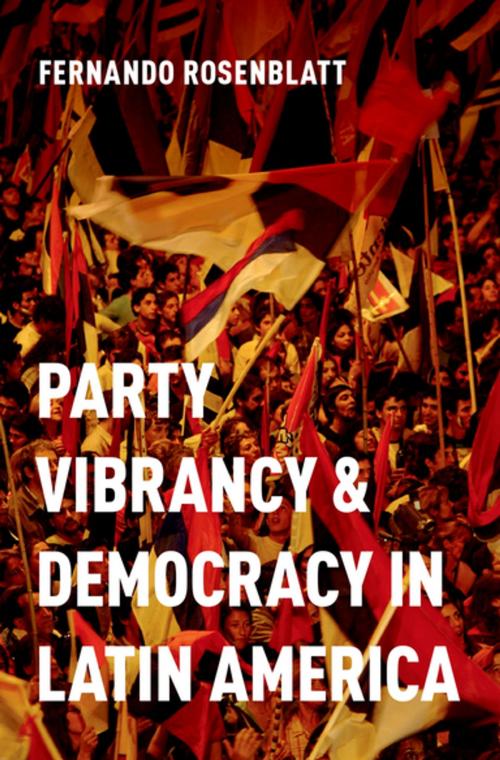Party Vibrancy and Democracy in Latin America
Nonfiction, Social & Cultural Studies, Political Science, Government, Elections, Politics, History & Theory, International| Author: | Fernando Rosenblatt | ISBN: | 9780190870065 |
| Publisher: | Oxford University Press | Publication: | May 1, 2018 |
| Imprint: | Oxford University Press | Language: | English |
| Author: | Fernando Rosenblatt |
| ISBN: | 9780190870065 |
| Publisher: | Oxford University Press |
| Publication: | May 1, 2018 |
| Imprint: | Oxford University Press |
| Language: | English |
Even in Latin America's most socially and economically stable countries, new parties emerge constantly, old parties collapse, and party systems across the region are notoriously fragile. Still, there are also successful stories. There have been a number of parties in Colombia, Chile, and Venezuela that used to be able to operate well beyond electoral cycles and preserve a significant presence in their respective countries for decades. How do such political parties remain vibrant organizations over time? In Party Vibrancy and Democracy in Latin America, Fernando Rosenblatt sheds new light on how party vibrancy is maintained and reproduced over time in three of the region's more stable countries-Chile, Costa Rica, and Uruguay. Referencing these three "consolidated" democracies with records of good governance, Rosenblatt identifies the complex interaction between four causal factors that can explain party vibrancy: Purpose, Trauma, Channels of Ambition, and Moderate Exit Barriers. "Purpose" activates prospective loyalty among party members. "Trauma" refers to a shared traumatic past which engenders retrospective loyalty. "Channels of Ambition" are established routes by which individuals can pursue political careers. Finally, "Moderate Exit Barriers" are rules that set costs of defection at reasonable levels. When these factors work together throughout a party's "Golden Age," they can demonstrate a link between party organizations´ stability and the quality of democratic representation across Latin America. As Rosenblatt finds, when parties remain vibrant organizations, democracies are better able to withstand challenges long-term. A unique qualitative study, Party Vibrancy and Democracy in Latin America demonstrates how the vitality of political parties can directly and indirectly impact how effective they are as intermediaries for their citizens not just in Latin America, but around the world.
Even in Latin America's most socially and economically stable countries, new parties emerge constantly, old parties collapse, and party systems across the region are notoriously fragile. Still, there are also successful stories. There have been a number of parties in Colombia, Chile, and Venezuela that used to be able to operate well beyond electoral cycles and preserve a significant presence in their respective countries for decades. How do such political parties remain vibrant organizations over time? In Party Vibrancy and Democracy in Latin America, Fernando Rosenblatt sheds new light on how party vibrancy is maintained and reproduced over time in three of the region's more stable countries-Chile, Costa Rica, and Uruguay. Referencing these three "consolidated" democracies with records of good governance, Rosenblatt identifies the complex interaction between four causal factors that can explain party vibrancy: Purpose, Trauma, Channels of Ambition, and Moderate Exit Barriers. "Purpose" activates prospective loyalty among party members. "Trauma" refers to a shared traumatic past which engenders retrospective loyalty. "Channels of Ambition" are established routes by which individuals can pursue political careers. Finally, "Moderate Exit Barriers" are rules that set costs of defection at reasonable levels. When these factors work together throughout a party's "Golden Age," they can demonstrate a link between party organizations´ stability and the quality of democratic representation across Latin America. As Rosenblatt finds, when parties remain vibrant organizations, democracies are better able to withstand challenges long-term. A unique qualitative study, Party Vibrancy and Democracy in Latin America demonstrates how the vitality of political parties can directly and indirectly impact how effective they are as intermediaries for their citizens not just in Latin America, but around the world.















